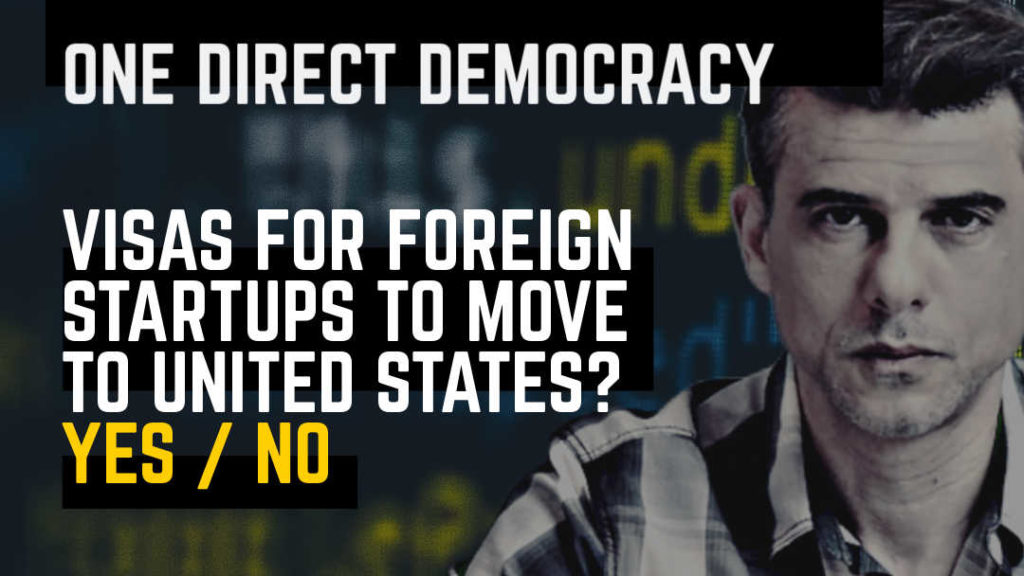Visa For Foreign Startups To Move To US? Yes / No
A $350 billion government program called the COMPETES ACT has been passed by the House Of Representatives in the United States to (among other things) encourage people from all over the world to establish their startup in the United States.
Should your country compete for the best tech talent in the world and try to encourage them to establish their startups in your country or should you just try to support your local startups or both? And if you could vote on this bill directly, would you vote for it or against it?
If you’re new to my content, One Direct Democracy is a movement for upgrading the global democratic system by taking the power away from politicians and putting it in the hands of the people by using Direct Democracy. It will also eliminate left and right politics. I’ve created the technology and a plan for how to make it work. If you want to learn more about it, check out the links in the description.
I’ll pick an important issue, give you an outline of the problem, suggest possible solutions then you can decide how you would vote.
In this case, we’ll be talking about how to attract foreign startups to your country.
If you’re just looking for another talking head that has no interest in actually doing anything, you’re in the wrong the place. If you want to be part of the solution, let’s get into it.
This Bill has multiple objectives including competing with China and restricting China. For the purpose of this video, I’ll just be talking about competing for tech talent and tech startups.
According to this article from Forbes:
“The House bill would create a new immigrant visa category. The “W” visa would particularly benefit three groups of foreign nationals: W-1s, being entrepreneurs with at least a 10 percent ownership interest in a start-up formed within five years of the date of the visa application; W-2s, being essential employees of a start-up; and W-3s, being visas for their spouses and children.”
So the clear objective here is to make it easier for startups to move from their own country to the US and effectively transform the startup into an American startup.
“The W visas have eligibility requirements regarding levels of investment from qualified investors and a showing that the principal applicants have knowledge and skills that would substantially assist the start-up. The W work visas would allow an initial validity period of three years with the possibility of 3-year extensions and 1-year extensions if investments and job creation meet certain standards.”
So this Bill is effectively giving startups 3 years to succeed or achieve a milestone that indicates that it’s on the way to success in order to justify an extension. At the end of the three years there are provisions that allow people with W visas to transition into permanent residents. That make sense, because people won’t move their startup to another country temporarily. They need to know that there’s an option to make the move permanent.
“The COMPETES Act also provides science, technology, engineering or mathematics (STEM) Ph.D. graduates seeking to work in the United States in a field related to such degree (and their immediate family members) a direct path to legal permanent resident status.”
So this Bill is trying to attract graduates not just startups and their employees.
“Foreign nationals with STEM PhD degrees, whether from the United States or foreign equivalent degrees, would be exempted from the annual green card limits. This would allow these PhDs to circumvent the immigrant visa backlog that so many PhDs, especially those from India and China, currently face.”
So this is an attempt to prioritize processing of Visa’s for people that have STEM PhD degrees over other graduates.
“Applications for the W nonimmigrant work visa, the W immigrant visa, and the STEM immigrant visa would require the payment of an additional $1,000 supplemental fee that will be used to fund scholarships for U.S. STEM students.
This is interesting because it will raise money for scholarships for local students that want STEM degrees.
“Giulia Imperatrice, the COO of WEVE Acceleration, a business accelerator focused on generating international startups in the U.S. said, “The COMPETES Act marks a step in the right direction for the U.S. immigration system, encouraging entrepreneurs from around the world to bring their business to the U.S. and providing them with a specific work permit to do so.” She added, however, “Although promising, the criteria for this new W visa need to be carefully considered to ensure it will accommodate the talent this Act aims to actually recruit.”
No Bill is prefect and every Bill can have unintended consequences.
Richard Burke, the CEO of Envoy Global, a company in the field of global workforce management…went on to point out that, “75 percent of U.S. graduate students are foreign-born and there is an urgent need to provide them a viable and real path to permanent residence so as not to lose America’s investment in them and to help revitalize America’s economy.”
Burke is suggesting that most foreign students complete their degree then return to their home country but the US would benefit from encouraging them to stay in the US and apply their degree in the US.
Other commentators think that if the immigration provisions make it through the process, the United States would take “a big step toward increased competitiveness for foreign talent with other countries that make entry and permanent residence for select individuals much easier.” Indeed, as a Jackson Lewis blog points out, “The United States is a popular destination for start-up founders, but many other countries (including Canada, the United Kingdom, China, Japan, Israel, Germany, Australia, and New Zealand) are competing to entice entrepreneurs to their shores.”
In the end, that’s what this is all about. What is it worth to your country to have the these startups and their employees setup in your country?
Frances Simowitz, the CEO of WEVE Acceleration, added,”The W-1 visa for entrepreneurs would be a significant step forward towards easing the immigration process for a group of people that have not had a dedicated visa classification, and who create significant economic opportunities in the US. 55% of unicorn startups, meaning they are valued at over $1 billion dollars, we’re founded by immigrant entrepreneurs. Many other countries, like Canada, already have these types of visa programs in place because it creates a competitive advantage to attract talent to the country.
This is an important point and everybody in the startup world knows it. For some reason that nobody has been able to explain, immigrants are much more likely to create a successful startup than non immigrants. One of the more reliable ways to create jobs in your country is to encourage immigrants to start new businesses. Some people obviously don’t like what I just said but facts are facts.
I’ve created a listing on the ODD platform so that we can develop ideas about the best way to attract foreign startups. You can add your own ideas or vote and comment on ideas from other people. You can also create your own listings for people to vote on. It’s a simple get used to using the ODD system.
So that’s the summary of the key issues.
Should your country compete for the best tech talent in the world and try to encourage them to establish their startups in your country or should you just try to support your local startups or both? And if you could vote on this bill directly, would you vote for it or against it?
The reality is that we have reached a point in time in our evolution where Representative Democracy no longer serves the will of the people and technology can solve the problems that made Direct Democracy impractical.
That’s why I created One Direct Democracy. It’s a movement for upgrading the global democratic system by taking the power away from politicians and putting it in the hands of the people by using Direct Democracy.
I’ve created the technology and a plan for how to make this work. We don’t have to convince any politicians or powerful people to do anything to make this happen. We have the power to do it on our own. We just have to decide to do it.
If you’re new to all of this, check out the other videos in my channel and the links in the description. Direct Democracy is the purest form of democracy. Representative Democracy is an outdated blunt instrument.



